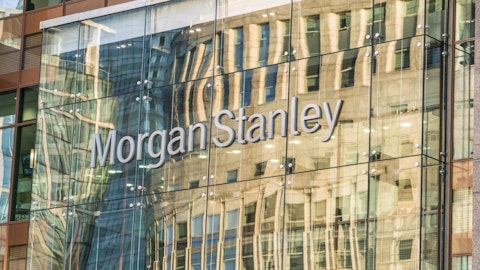Discover Financial Services (NYSE:DFS) Q1 2024 Earnings Call Transcript April 18, 2024
Discover Financial Services isn’t one of the 30 most popular stocks among hedge funds at the end of the third quarter (see the details here).
Operator: Good morning. My name is Todd, and I will be your conference operator today. At this time, I would like to welcome everyone to the First Quarter 2024 Discover Financial Services Earnings Conference Call. [Operator Instructions] Please note, there will be no question-and-answer period after this morning’s prepared remarks. After the call ends, questions should be directed to the Discover Investor Relations team. [Operator Instructions] I will now turn the call over to Mr. Eric Wasserstrom, Senior Vice President of Corporate Strategy and Investor Relations. Please go ahead.
Eric Wasserstrom: Thank you, and welcome to this morning’s call. I’ll begin by referencing Slides 2 and 3 of our earnings presentation, which you can find in the Financial section of our Investor Relations website investorrelations.discover.com. Our discussion today contains certain forward-looking statements that are subject to risks and uncertainties that may cause actual results to differ materially. Please refer to our notices regarding forward-looking statements that appear in our first quarter 2024 earnings press release and presentation as well as the risk factors detailed in our annual report and other filings with the SEC. Our call today will include remarks from our Interim CEO, Michael Shepherd; and John Greene, our Chief Financial Officer. There will be no question-and-answer session following today’s remarks. However, the Investor Relations team will be available for any inquiries. It’s now my pleasure to turn the call over to Michael.

Michael Shepherd: Thank you, Eric, and good morning, everyone. Thank you all for joining today’s call. I’d like to begin the call with a few words of introduction. I joined Discover’s Board in August of 2023 after a career in the public and private sectors, more than 30 years of which were in the financial services industry. Among other roles, I served as Senior Deputy Controller of the Currency earlier in my career. Most relevant to my current position, I was Chairman and CEO of BancWest Corporation and Bank of the West. As Chairman of Bank of the West, I helped oversee its acquisition and integration into the Bank of Montreal in 2023. I hope my experience will help me serve our shareholders customers and employees as an effective leader during this important period.
John Greene will discuss the results of the first quarter in greater detail, but let me highlight a few aspects of our financial performance. Discover’s operating performance remained solid with increased revenues in the period, driven by good loan growth, largely reflecting payment rate normalization and a resilient net interest margin. We are seeing receivables expansion while remaining prudent in our underwriting and disciplined in customer acquisition. Credit continues to perform in line with our expectations and delinquency formation has stabilized as we had anticipated. Importantly, we continue to strengthen our risk management and compliance programs where we are investing in meaningful resources. In the first quarter, following continuing internal reviews, and after extensive discussions with several constituencies, including merchants and regulators, Discover decided to significantly increase our liability for the card misclassification issue.
We believe that taking this action will advance the resolution of these issues. There’s been a lot of change at Discover over the last few months and I thought it might be helpful to emphasize our framework for decision-making. Our goals are to maximize shareholder value by executing on our risk management and compliance priorities, sustaining our commitment to outstanding customer service and seeing that the company remains well positioned to drive long-term value creation. As the interim CEO of Discover, I’m committed to these objectives, which will improve our company and allow us to make the strongest contribution to the combined Capital One. The Capital One team is leading the integration planning process and we look forward to partnering with our colleagues in support of our shared objectives.
See also 14 Best Large Cap Dividend Growth Stocks To Buy Now and Top 15 Cities Where Gen Z is Moving in the US.
Q&A Session
Follow Discover Financial Services (NYSE:DFS)
Follow Discover Financial Services (NYSE:DFS)
Receive real-time insider trading and news alerts
The process has achieved the first important milestone, the submission of the merger applications to the Federal Reserve and the OCC. We continue to believe that the strategic rationale, operating scale and economics of the combined company are compelling. The merger will advance the company’s shared mission to help our customers meet their financial goals support our commitments to our communities and make the combined company a well-positioned bank and a competitive payments network of the future. Finally, I’d like to thank Michael Rhodes for his leadership through an important phase. His new position allows him to fulfill his career goal of leading a public company and my colleagues and I wish him well. With that, I’ll now ask John Greene to review our first quarter 2024 financial results.
John Greene: Thank you, Michael, and good morning, everyone. I’ll start with our summary financial results on Slide 5. In the quarter, we reported net income of $308 million, which was down 68% from the prior year quarter. Impacting our operating results was a $799 million increase to our reserve for remediation related to the card misclassification issue. The decision to increase the reserve was based upon, among other factors, the company’s experience to date with remediation efforts, regulatory dialogue and our pending merger with Capital One. As Michael indicated, we believe this action is aligned with our compliance and risk management objectives and will significantly help advance the resolution of this issue. Our core financial performance remains strong.
Key highlights for the quarter include double-digit revenue expansion from loan growth, a resilient net interest margin strong consumer deposit growth and credit performance consistent with our view that losses will peak and plateau in mid to late 2024. Excluding the card misclassification remediation reserve increase, we would have reported net income of approximately $915 million, EPS of about $3.50 per share and an efficiency ratio under 36%. These figures indicate a strong start to 2024. Let us review the details beginning on Slide 6. Our net interest margin ended the quarter at 11.03%, down 31 basis points from the prior year and up 5 basis points sequentially. On a quarter-over-quarter basis, expanding loan yields from a lower card promotional balance mix and payment rate moderation were partially offset by higher net funding costs.
Receivable growth is slowing from its peak in the first quarter of 2023, but continues to be strong. Card receivables increased 11% year-over-year due to a lower payment rate and contribution from prior year new account growth. The payment rate declined about 20 basis points from the sequential quarter and is now about 70 basis points above 2019 levels. Discover card sales were down 1% compared to the prior year quarter. Sales slowed across categories with the largest decline occurring in the everyday category, which includes supermarkets, gas and wholesale clubs. While we continue to add new accounts, in general, we are seeing card members spend less, particularly among lower-income households which are most impacted by the cumulative effects of inflation.
Based on trends in the period, we expect sales to be flat to slightly negative this year. Personal loans were up 21%, driven by continued strength in originations and lower payment rates versus the prior year. We are seeing strong uptake on our offering as higher interest rates in card can make debt consolidation more appealing for Summit consumers. Approximately 50% of our first quarter originations and personal loans were utilized for debt consolidation with disbursements primarily made directly to creditors. Student loans were flat year-over-year. As previously announced, we stopped accepting applications for new student loans on February 1. We formally launched the sales process in mid-March and several thousand potential buyers have provided an initial indication of interest.
We continue to anticipate strong demand and still target a closing date late in the third quarter or fourth quarter. Average deposits were up 18% year-over-year and 4% sequentially. Our direct-to-consumer balances grew $3 billion in the period. We have started to decrease pricing on our deposit products ahead of any potential moves in reference rates. This is consistent with our practice of leading the industry on pricing in the down part of the cycle and this action contributed to our strong NIM performance in the quarter. Looking at other revenue on Slide 7. Noninterest income increased $113 million or 19%. This was primarily driven by higher net discount and interchange revenue, an increase in loan fee income and higher transaction processing revenue from our PULSE business.
PULSE continued to grow at a healthy clip as debit volume increased by $13.8 billion or 21% year-over-year. Our rewards rate was 139 basis points in the period, a decrease of 2 basis points versus the prior year quarter. The decline reflects lower cash back match from slowing new account growth and the active management of our 5% categories. Prior to reviewing expenses, I would like to briefly comment on the CFPB late fee proposal. We continue to closely monitor the legal process around the proposal. If the rule were to be implemented, on an annualized basis, we estimate a pretax reduction of around $600 million or approximately 4% of revenues. Moving to expenses on Slide 8. Total operating expenses were up $926 million or 67% year-over-year.
As mentioned, the predominant driver of this growth was the increase to our remediation reserve. Absent this, our expenses would have increased 9% year-over-year. Looking at our major expense categories. Compensation costs increased $46 million or 7% due to an increase in business technology resources and severance related to organizational changes including the wind down of our student loan business. Professional fees were up $60 million or 26%, driven by continued investments in compliance and risk management initiatives higher recovery fees and merger-related expenses. Information processing increased due to technology investments. Our expectation for compliance and risk management expenses for the year excluding remediation-related costs, remains in the $500 million range with an upside bias.




